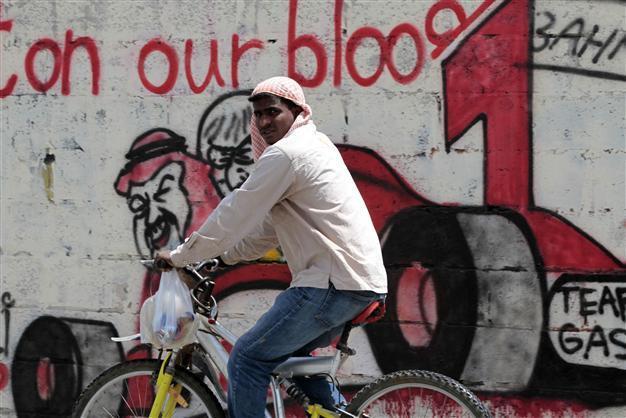Wave of arrests ahead of Bahrain Grand Prix: NGO
DUBAI - Agence France-Presse

A man cycles past graffiti art with images of Bahrain's King Hamad bin Isa Al Khalifa and Formula One's Bernie Ecclestone on Wednesday, April 18, 2012, in Barbar, Bahrain, opposing Sunday's F1 Bahrain Grand Prix. AP photo
Bahrain has arrested about 80 leading democracy activists in an attempt to contain anti-government protests ahead of this weekend's Formula One Grand Prix race, a rights group said Wednesday.
"About 80 people from several villages near (the capital) Manama have been arrested since April 14," the president of the Bahrain Youth Society for Human Rights, Mohammed Maskati, told AFP, adding that the "mass wave of arrests is a preventive measure" by the authorities.
He said most of those arrested are "protest leaders" that have been organising near-daily demonstrations against the government in the kingdom's Shiite villages.
The arrests came as authorities beefed-up security around Bahrain's Shiite villages and on route to the Sakhir circuit where Sunday's race will take place, witnesses said.
Tensions have been mounting in the unrest-hit kingdom ahead of the controversial Formula One race as the opposition and youth activists capitalise on renewed international attention on Bahrain's year-long political and sectarian crisis.
On Wednesday, dozens of protesters gathered in the Shiite village of Sanabis carrying banners demanding the ouster of the Khalifa regime.
"Down Hamad" read one banner referring to the island's king. "The people want the fall of the regime," read another, echoing a common phrase used in last year's Arab Spring uprisings.
Witnesses at the scene said the protesters timed their demonstration to coincide with a visit to the village by Crown Prince Salman bin Hamad Al-Khalifa.
Similar protests were also held Tuesday, with hundreds, carrying banners calling for a boycott of the race, demonstrated near Bahrain's international airport as Formula One teams began arriving in the Sunni-ruled kingdom.
"Our demand: Freedom not Formula," read one banner Tuesday. "We are human without rights," read another.
Prominent Shiite activist Abdulhadi al-Khawaja, who is on a hunger strike and has been convicted to life in prison has said that he will refuse intravenous infusions starting Wednesday and drink only water, according to his wife.
His lawyer, Mohammed Jeshi, told AFP Wednesday that he had not been in touch with Khawaja and was unable to confirm if the rights activist had stopped the IV infusions "or if the authorities were force feeding him." Khawaja's deteriorating health has raised fears that his potential death could spark a wave of violence in the already tense kingdom.
Bahrain's largest opposition grouping, Al-Wefaq, has called for a week of daily demonstrations and sit-ins to last through the end of the April 22 race.
The more radical February 14 Youth Movement, however, has called for "three days of rage" to coincide with the event.
The F1 race in Bahrain was cancelled last year in the wake of the Shiite-led uprising and the brutal government crackdown that followed in which 35 people were killed, according to an independent probe.
In mid-February 2011, Bahraini pro-democracy activists, inspired by the revolutions of the Arab Spring in Egypt and Tunisia, poured onto the streets of Manama, demanding political reform and greater representation.
A month later, the government brutally crushed the uprising and bulldozed its symbol, a large monument on a main roundabout known as Pearl Square.
Though the number of protests decreased in the immediate aftermath of the crackdown, they have steadily gained steam in recent months, with a dramatic increase in the number and intensity of demonstrations in the lead-up to the uprising's one-year anniversary.
